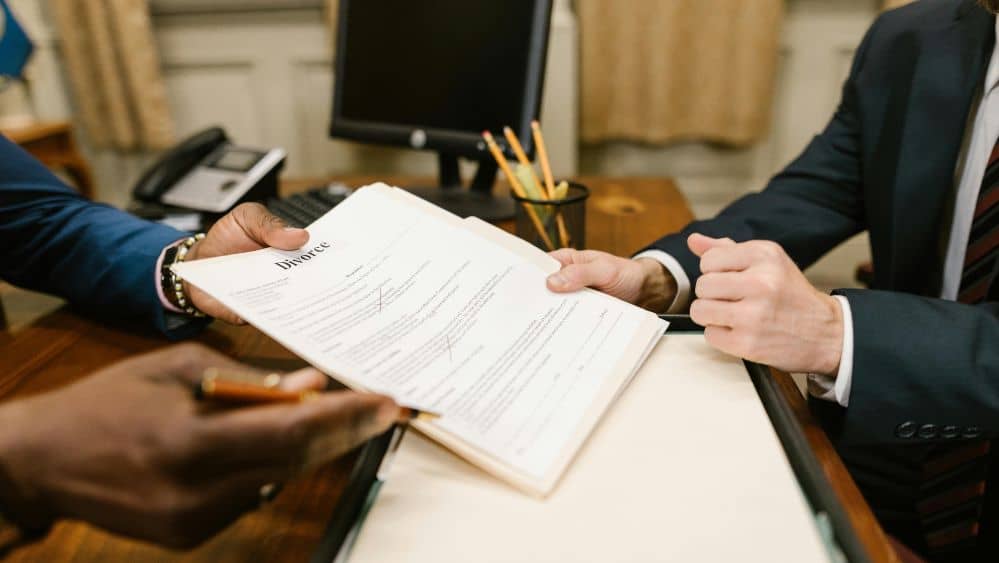If I Am Served Divorce Papers, Do I Have to Sign Them?

Receiving divorce papers from your spouse can trigger a flood of emotions and confusion about the next steps. You may be wondering if you’re legally obligated to sign those documents that were served to you. The short answer is no – you don’t have to literally sign the divorce papers themselves.
However, that doesn’t mean you can simply ignore them. Divorce filings initiate a formal legal process, and failing to respond properly can have unintended consequences that jeopardize your rights and interests.
What’s in Those Divorce Papers and Why It Matters
Divorce papers consist of two primary documents:
- Petition for Divorce: Outlines the grounds for divorce and the terms proposed by your spouse, such as property division, child custody, and support.
- Summons: Informs you that your partner has filed a divorce action against you and specifies the deadline for your response.
Divorce papers are typically served in one of two ways:
- Personal service by a sheriff or process server
- Service by certified mail
Receiving the divorce documents signifies that your spouse has officially initiated a legal process against you. So, you must take action within a specified timeframe or face a default decision by a judge.
Do You Have to Sign the Divorce Papers?
No, you do not have to sign the documents when you receive them. However, not signing the papers does not mean you can ignore them.
After proper service or process, the law legally obligates you to file an answer within a specified timeframe, typically 20 days in Texas.
Failing to respond can result in the courts granting the divorce on the terms proposed by your spouse without your input.
Your Options for Responding to Divorce Papers
You have several options when responding to a divorce petition:
- File an Answer: A legal document that addresses the allegations made in the divorce petition and asserts your rights.
- Contest the Divorce: If you disagree with the grounds for divorce or the proposed terms, you can challenge the petition and negotiate a settlement.
- Reach a Settlement: You and your spouse can work together to reach a settlement, agreeing on the terms of the divorce outside of court.
No matter which path you choose – answer, contest, or settle – having an experienced divorce lawyer guide you through the response process is invaluable for protecting your rights and interests every step of the way.
The Risks of Failing to Respond to Divorce Papers
You may be tempted to ignore divorce papers or refuse to sign the document after receiving it. However, consequences exist when you choose this option.
Failing to respond to the divorce petition within the required timeframe will provoke your spouse’s divorce lawyer to file a default judgment with the court.
Default Judgment, Explained
Under Texas default judgment rules, family law judges may grant divorces on the terms outlined in the original petition without considering the respondent’s input or objections.
By not signing or responding to the divorce papers, you risk:
- Losing the opportunity to assert your rights and protect your interests.
- Having less control over the outcome of your divorce.
- Potentially receiving an unfavorable judgment regarding property division, child custody, and support.
It’s important to remember that signing the divorce papers does not necessarily mean you agree with the terms proposed by your spouse.
Instead, it acknowledges that you have received the documents and intend to participate in the legal process.
Don’t Neglect Those Divorce Papers – Respond with a Lawyer’s Help
Being served with divorce papers can be emotionally jarring. You may feel tempted to ignore them or respond hastily without legal guidance. However, failing to properly answer the petition can have severe unintended consequences.
This is why retaining an experienced divorce attorney is crucial once those papers arrive. Your lawyer will ensure you meet all mandatory response deadlines and file to address concerns like asset division, child custody, spousal support, and more. They understand the nuances of crafting a strategic answer that protects your rights and interests.
Going it alone leaves you at risk of making simple but costly missteps that could result in an unfavorable default judgment. Your lawyer advocating on your behalf prevents such outcomes and provides you with professional legal counsel during this process.
Don’t let those divorce papers catch you unprepared. Having a skilled attorney respond and represent you from the outset goes a long way in positioning you for the best possible resolution.
Have You Been Served Divorce Papers? Contact Dodson Law Firm, PLLC Today
Being served with divorce papers can provoke a whirlwind of emotions – anger, sadness, denial. In that overwhelmed state, your first instinct may be to ignore the papers or rashly respond without legal guidance.
However, failing to properly answer the petition can severely jeopardize your rights and interests down the line. Don’t make decisions now that you’ll regret later.
Instead, remember these key points:
- You do not have to sign the divorce papers immediately but must respond within the specified timeframe.
- Seek the guidance of an experienced divorce lawyer who can protect your rights and help you make good decisions.
- Texas family law has specific procedures that can impact your case. So, you must understand them while divorce moves through the family court system.
If you have been served with Texas divorce papers, schedule a confidential case evaluation with the experienced family law attorneys at Dodson Law Firm, PLLC.
Our legal team can help you understand your options – contact us today.
 Wendi Dodson is an experienced attorney and the founding partner of Dodson Law Firm, PLLC, a family law and personal injury firm in Houston, TX. Her practice areas include divorce, child custody, child support, spousal support, property division, and personal injury cases. As a Texas Certified Mediator and graduate of Harvard Law School’s Program on Negotiation, Wendi brings exceptional conflict resolution skills to her practice.
Wendi Dodson is an experienced attorney and the founding partner of Dodson Law Firm, PLLC, a family law and personal injury firm in Houston, TX. Her practice areas include divorce, child custody, child support, spousal support, property division, and personal injury cases. As a Texas Certified Mediator and graduate of Harvard Law School’s Program on Negotiation, Wendi brings exceptional conflict resolution skills to her practice.



